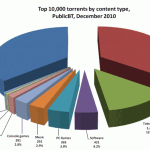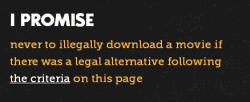Weekly News Roundup (6 February 2011)
Welcome to a new month, the month with arguably the hardest to spell name (Febuary? Februarey?), and also the hardest to remember in terms of number of days it has (hint, it’s not 30 or 31, and it’s not always the same every year either). February is what you would call “high maintenance”, if it were a person.
The promised Facebook/Twitter competition should be launched in the next day or two. There’s nothing you actually need to do, if you’re already liked our Facebook page and/or followed us on Twitter, you’ll automatically be entered into the draw to win some Amazon gift certificates (those that signed up before early will receive a better chance to win). Full details to be posted when I make it up. Before then, we have this week’s news to go through, so let’s get started.
 In copyright news, the big headline of the week, at least according to the MPAA, was that almost a quarter of the world’s web traffic was piracy related.
In copyright news, the big headline of the week, at least according to the MPAA, was that almost a quarter of the world’s web traffic was piracy related.
To be honest, I had expected a lot more than that, considering that out of the big files you can download, Linux ISOs aside, I can’t really think of a lot of legal content that’s 8GB or 12GB in size, whereas many pirated games are. Without iTunes HD movie downloads, and Steam, the quoted 23.8% of global traffic being pirated related, could have been a lot higher. The study was commissioned by NBC Universal, but it was the MPAA that screamed the loudest at the findings. Except, as usual, they missed some really important points in the report. One interesting note was that the US actually had a lower piracy rate than the rest of the world, which is strange because most of the pirated stuff comes from the US (movies, TV shows, games), and what with the poor economy and relatively cheap Internet, you just expected the US to be the lead in terms of piracy. Another interesting result was that only 2.9% of downloads on the BitTorrent networks that the study monitored were for music, with films and TV accounting for nearly half of the downloads (and 35.8% being pornography).

Music torrent downloads only count for a very small percentage of downloads, according to the Envisional report (graph credits: Envisional report)
The theory is that the US has greater access to legal content, and so there’s less reason for many to get content via illegal sources. This is definitely true with TV shows, since Hulu and the other streaming networks, which block access from outside the US, means that there’s almost no reason to download torrents of the latest episodes. The low number of music downloads could be because that torrents have never been the best way to download music, not when LimeWire was around anyway. But it could also be because music availability is greater in the US, and that music, unlike movies and especially TV shows, don’t suffer from the same sort of delay releases and release windows, that actively prevents people from purchasing in order to maximize profits for publishers from different channels. In this day and age, having to wait a whole week before you have access to the latest episode of say The Office or even months before you can buy Boardwalk Empire on DVD/Blu-ray, just doesn’t work. When your friends or co-workers are downloading/streaming illegally and then discussing the latest episodes, you almost have to download/stream it yourself. And porn? Well, nobody wants to have to pay for porn, or to have something less than innocent show up on their credit card statement, so that’s another reason why it’s so popular.
So the fact that “it’s free”, while I do agree has a lot to do with why pirated content is so attractive, but there are clearly other factors in play that should not be ignored, if one is really intent on reducing online piracy. Unfortunately, groups like the MPAA and RIAA’s goal is to eventually get legislation that guarantees their revenue stream, and online piracy just happens to be a convenient excuse at the moment. It’s an easy argument to convince ignorant politicians, unaware of just what the Internet is all about. With all the studies being done, none has even tried to find out the real financial cost of piracy, not the billions upon billions imagined by the MPAA/RIAA. Not in the US anyway. But a Japanese government backed think-tank has looked at the problem, and has found some interesting answers. In regards to Anime and online streaming and P2P downloads via the popular (in Japan) Winny software tool, the study found that these kinds of piracy not only did not hurt DVD sales, it actually helped. YouTube uploads of Anime episodes actually helped to generate more sales, while P2P downloads did not hurt sales at all, only rentals. The promotional effects of YouTube uploads, even of full episodes, has been known for a while now, and you’d be hard pressed to find one publisher that doesn’t utilize YouTube for promotional purposes. And as for P2P downloads, with DVDs so cheap and online piracy so easily accessible for so long, people who still buy DVDs will always buy DVDs (or Blu-rays), in my opinions, because if free and easy hasn’t convinced you do break the law, nothing will (and for people who like to collect things, like me, buying and downloading are two totally separate things).
And the findings of these reports don’t really contradict a study by Warner Bros. back in December, where the conclusion there seem to be that a lot of people downloading pirated TV shows and movies are downloading the foreign dubbed version, which would otherwise not be available via legal means. And that by not fulfilling the needs of the market, that legitimate consumers are being pushed into pursuing content via other means, including illegal means. Which brings us to this week’s most interesting copyright related news story – the Don’t Make Me Steal manifesto. What is it? Well, it’s basically a list of demands, that if met, the people who signed the manifesto would all promise not to download pirated movie of TV content. It sounds a bit like a threat, which is why it’s controversial (and I don’t think the “Don’t Make Me Steal” title is a good one, because in the end, nobody “makes” you steal, it’s still a choice, even if it is sometimes the most sensible one). But these are not really unreasonable demands. They’re not demanding everything be free, and actually, a lot of demands match up perfectly to what the recent studies have concluded, that a lot of people are being under-served. Removing release windows, reasonable pricing (buying DVD/Blu-rays should not cost more than a movie ticket, and rentals should not cost more than a third of the same ticket), greater access to dubs and subtitles, no DRM, and a lot of others things I suspect that the movie/TV industry will eventually figure out on their own and implement. So if this manifesto can change the debate from one of “how should we punish those that pirate stuff” to “how do we encourage people not to pirating stuff”, then it has served its purpose. It shows there are plenty of things movie and TV studios can do to reduce piracy, and they should at least give these suggestions some serious thought before trying to shift the blame and responsibility to everyone else.
All of this comes as the number of individuals sued by mass piracy lawsuits reached 100,000 in the US alone. Both piracy and anti-piracy, in my opinion, has gotten out of control, and the only real solution is to examine the real causes behind piracy. Or it will end up becoming a futile fight, where the process becomes a daily grind of trying to put out millions of fires with no positive effect towards actually solving the problem, something that was addressed well by the TV show The Wire (in relation to the war on drugs, but the idea is the same). How many websites do you have to get Homeland Security to shut down before the war on piracy can be won? How many civil rights do we have to sacrifice in order for the entertainment industry to keep their dying business model? How many people must be sued for illegal downloads before people stop downloading? And how long would all of these actions take before the problem is solve. Years? Decades? Never?
And not wanting to enjoy schadenfreude, Intel’s problems with Sandy Bridge seems like karma biting back for putting in hardware DRM into the new chip, and then for not even admitting it was DRM, even though it clearly was. The actual problem appears not to be that serious, it’s a flaw on the motherboard chipset that Sandy Bridge CPUs rely on, and it has to do with the SATA2 controller part which will fail over time for a small percentage of chips. Disabling the rogue transistor, or simply use the provided SATA3 ports instead, would be a simple workaround, at least until Intel can provide details on how they plan to fix the problem. Still, had Intel spent more time testing Cougar Point, instead of getting all giddy at the prospect of adding hardware DRM, maybe they could have avoided the potential billion dollar problem.

Onto HD/3D news, not a whole lot happening really in the world of Blu-ray or 3D. But for general HD, and I know I’m stretching a bit here, then the news that Microsoft plans to solve Google’s H.264 problem may be somewhat interesting.
Google dropped support for H.264 as part of its HTML5 implementation, and this means that HTML5 videos that use H.264 would not actually work on Google’s Chrome browser, which is a shame. Google quotes wanting to support “open software” as the reason, despite the fact that they’re the biggest supporters of the closed Adobe Flash software, being the only browser to bundle Flash with the default download. But Microsoft has been actively trying to get people to use H.264 for HTML5, no doubt because they own lots of patents on the format, and so they’ve released a Chrome extension that brings back H.264 support, for those with Windows 7 anyway (which has H.264 decoding built natively into the OS). They did the same thing for Firefox a couple of months ago, so this move wasn’t unexpected. And Google can hardly complain, considering their stance towards Flash.
You may ask what is Google’s motive behind dropping H.264, if it wasn’t for the sake of “openness”? Some would say it’s because they want people to use their own WebM format, for which Google owns the patents on (but has decided, for now, not to charge royalty). Maybe. But Google’s real target, in my opinion, is Apple. Apple loves H.264, they also only support HTML5 (not Flash) on their iDevices, and being a fairly closed system in which Apple has control over everything, it’s unlikely WebM support will be implemented without Apple’s permission for these devices and Safari in general. So Google’s move alienates Apple, while their own Android platform still manages to support H.264, Flash and WebM, with hardware acceleration too even. To me, this is a calculated move against Apple, forcing Apple to either accept WebM and implement hardware support for it, or to live with an YouTube app that runs poorly on iDevices. And Google’s alliance with Flash, and Apple’s anti-Flash stance, just further confirms what I and many others think.
Of course, there’s no guarantee that WebM will be adopted, not even by YouTube. In fact, this move most likely benefits Adobe and Flash, since it then becomes the only way to tie everything together, and get everything working, especially since Adobe has already announced they will add WebM support to Flash. And H.264 will be here to stay, as long as Flash is here to stay, and as long as Blu-ray and iTunes still exists.
![]()
Another week, and the cat and mouse game between Sony and PS3 hackers continue. Sony brought out the 3.56 firmware to counter the hacked 3.55 firmware, but the process of hacking 3.56 has already begun and it’s a matter of when, not if, it will get hacked (because once the master key and the method it can be obtained became public, it’s really game over for that security platform).
And as expected, Sony’s war against hackers has caused its first piece of collateral damage, with PS3 owners that have upgraded their hard-drives being the first set of victim. Sony active encourages people to upgrade the PS3’s hard-drive, and even provides instructions on how to do it online (and it doesn’t void warranty either). They did this to counter the over-priced Xbox 360 hard-drive add-ons. But people who installed 3.56 found that their upgraded HDDs would no longer work, with a “The data is corrupted” error, even after reformatting. Apparently, Sony re-released 3.56 just now and it might have fixed the problem, but you need the original HDD to first upgrade to the new 3.56 (Sony didn’t call it 3.57 because they didn’t want to admit to their mistake? It’s not the first time either …), and then upgrade your HDD. Those without the original HDD (which has to still retains the original formatting) are still stuck with a bricked console, unfortunately. 3.57 will hopefully be here next week, but who knows.
So once again the advice is don’t upgrade your PS3’s firmware until at least a week after release. Yes, it’s a week that you may not be able to play online (or even certain games offline, which prevents play without an active PSN connection, which of course requires the latest firmware). I think if Sony is intent on releasing firmware updates so frequently, the least they should offer is a window in which both old and new firmware versions can be used, although I suppose there are huge technical issues related to supporting two firmware versions at the same time on PSN.
So that’s it for another week. Hope you’ve enjoyed this issue of the WNR. Have a good one and see you at the same time next week.




February 27th, 2011 at 5:55 pm
[…] last week of the “high maintenance” month of February is upon us, and it’s a relatively quiet one in terms of news stories […]